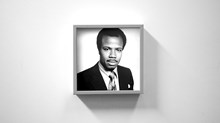"It's only when the tide goes out," says Warren Buffett, "that you learn who's been swimming naked."
For a good long time, the American health care system had its drawers down, but it didn't matter too much. HillaryCare was summarily dismissed in the early '90s. The problems it might have fixed weren't felt badly enough. Lately arguments for universal health care have been about the unavailable care for the uninsured. But still, no action. The vast majority in the country have health insurance, even if they pay more and more for it every year.
But now, even doctors can't afford to pay for health care. Oncologists, who have to pay for drugs before they're delivered intravenously to patients at the doctor's office, have had trouble lately paying up. As a result, they've learned to be more cautious about the costs of the treatments they recommend to their patients. The Wall Street Journal reports:
In a survey of 167 cancer doctors reported last year in the Journal of Clinical Oncology, 42% said they regularly raised the issue of costs when discussing treatment options with patients. The study, conducted by Deborah Schrag, an oncologist at the Dana Farber Cancer Institute in Boston, found that 23% of oncologists said costs influence their treatment decisions, and 16% said they omit discussion of very expensive treatments when they know the cost will place great strain on patients' resources. ...
John P. Whitecar Jr., an oncologist in Columbus, Miss., says 89% of his cancer patients are on government insurance. He has watched his income plunge 75% in the past three years because of rising treatment costs and declining reimbursements. He says he's borrowed money to keep his office afloat.
At what point should a Christian say, "This simply costs too much. Putting my family in debt or significantly straining their resources is not worth my life. Maybe God wants me in heaven."
Certainly life is priceless. But is more life equally invaluable?
Dying is different these days. Once, vast resources could go toward treating a man suffering from a heart attack. If he lived, he could continue living for decades, and those resources justifiably provided years of good living. Now, people die slowly, consuming those vast resources over the course of years–and often crippling relatives financially.
Joanne Lynn writes, "One hears people say, 'He's not dying yet,' of a person living with fatal lung cancer. Generally, that means he's not yet taking to bed, losing weight, and suffering from pain, as would be expected when dying is all that he can do. But the category is used as if one is either 'temporarily immortal' - which is the usual state of human beings - or 'dying,' in which case the person is of a different sort, having different obligations and relationships. 'The Dying' are expected to do little but wrap life up and go. But this dominant myth about dying does not fit many people. Many elderly people are inching toward oblivion with small losses every few weeks or months."
We are, of course, all always dying, thanks to sin. Our outer man is decaying. It seems these days its a good thing to remember and a good thing for Christians to try to re-teach our culture.
Economists have begun thinking about the "cost/benefit dilemma of end-of-life medical care." One writer on the Freakonomic blog says, "When Teddy Kennedy was diagnosed with malignant brain cancer a few weeks ago, the senator who championed universal health care opted for the rarest and most expensive treatment [unlikely to be provided by any state-paid insurance] - surgery followed by radiation and chemotherapy. But with or without surgery, the prognosis for patients with glioblastoma like Kennedy's is poor, with an 18-month survival rate for those over 60 less than 10 percent."
Wealthy and not at all ready to give up the ghost, Kennedy – like nearly every American would who can make the choice – is "fighting" for his life. Even the very, very old these days are opting for surgery and other risky and costly medical procedures that could extend their lives.
Yet, what is that extra time worth? Any universal health care system seems unlikely to provide expensive and marginally beneficial treatment. The government would decide it's not worth $1 million in taxpayer money to give an 85-year-old six more months of life. But unless and until the state starts making those decisions for us, we Christians need to think this one through: How much is longer life worth?
Here's another one: How should pastors help their parishoners decide? This is enough. It's time to see God.

Support Our Work
Subscribe to CT for less than $4.25/month


















